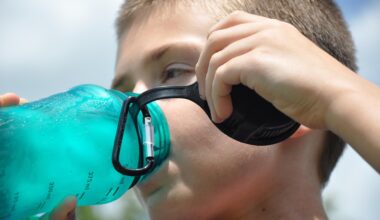Psychological Support During Rowing Injury Recovery
For rowers, experiencing an injury can be a significant setback both physically and mentally. Psychological support plays a crucial role in injury recovery. This support delivers an avenue for athletes to process their emotions. The emotional toll from an injury often manifests as anxiety, depression, or frustration. Having a robust support system can aid tremendously in coping with these feelings. It helps to talk through worries and fears with a knowledgeable individual who understands the challenges that come with rowing injuries. Therapists and sports psychologists can offer coping strategies tailored for rowers. A healthy mindset can facilitate a smoother recovery process. Learning relaxation techniques and visualization strategies assists with maintaining a positive outlook. Additionally, goal setting becomes paramount. Focusing on achievable milestones provides motivation throughout recovery. Certification in sports psychology gives professionals insight into athlete hurdles. Rowers should be encouraged to speak up about their mental health needs. Communicating these issues opens doors to necessary help. Integration of psychological support into the rehabilitation programs generates benefits not just physically, but also emotionally for the athletes.
Building a Support Network
Having a solid support network is essential for rowers recovering from injuries. Family, friends, coaches, and teammates constitute this vital network. They provide encouragement, companionship, and accountability. Rowers often feel isolated during recovery; a support group combats this feeling. Regular check-ins and social interactions keep spirits high during tough times. Sharing experiences with fellow athletes can make a significant difference. Rowers can join support groups or online forums that focus on injury recovery. This connection with others promotes understanding; it allows for shared experiences and coping mechanisms. Those who have faced similar challenges can Offer insights into recovery techniques. Additionally, rowers should foster relationships with physiotherapists or trainers who focus on mental health. Such professionals can provide adaptive strategies when facing setbacks. Open communication reinforces the support network. Telling loved ones when feeling down enables them to respond effectively. The significance of having someone to lean on cannot be underestimated. Emotional validation, understanding, and camaraderie can help mitigate feelings of loneliness or despair. In due time, these social connections can lead to enhanced resilience during rehabilitation.
Establishing realistic expectations is vital during the recovery process for rowers. Injuries can sideline an athlete for weeks, months, or even longer depending on severity. Understanding this timeline can alleviate disappointment. Setting gradual, reachable goals assists in maintaining motivation. Each minor achievement becomes a cause for celebration. Additionally, times when setbacks occur should be expected and prepared for. Developing a positive mindset is key when everything isn’t progressing as planned. Rowers must recognize that plateaus are part of recovery. Visualizing the end goal, like returning to the water, fuels motivation for each small step taken. Though progress might appear slow, encouraging words and support from friends or medical staff help maintain morale. Tracking progress in a journal creates a tangible reference point; this way, rowers see evidence of improvement. Consistently reminding themselves of each step can boost an athlete’s mental state. Incorporating physical and psychological milestones has substantial rewards. New techniques learned during recovery may enhance performance post-rehabilitation. Patience is crucial, as lasting recovery takes time and effort. Rowers should only compare themselves to their journey, not to others, as personal progress varies significantly.
Psychological Strategies for Recovery
Employing various psychological strategies during injury recovery can greatly aid rowers. Techniques such as positive self-talk are crucial in overcoming negative thoughts. Internal dialogues influence behavior; tailoring these conversations helps maintain motivation. Instead of focusing on what was lost, highlighting strengths cultivates resilience. Mindfulness practices such as meditation or deep breathing exercises help manage anxiety, promoting mental clarity. Such techniques encourage athletes to remain present, curbing frustration about the past or future uncertainties. Utilizing visualization also serves as a powerful tool. Rowers can mentally rehearse techniques and strokes while healing. Visualization practices create a stronger sense of control over their journey. Engaging in these activities frequently fosters belief in eventual recovery and performance enhancement. Setting specific, measurable, achievable, relevant, and time-bound (SMART) goals during recovery provides structure and direction. These goals must be periodically evaluated and adjusted based on progress. Consulting sports psychologists can provide insights into custom strategies based on individual situations. Implementing these psychological strategies can amplify the physical recovery process significantly. This blend of physical rehabilitation and mental support creates a holistic recovery experience.
Rowing is physical demand, but mental health holds equal weight in an athlete’s success. Research studies have documented the interconnectedness between mental well-being and physical recovery. Notably, mental resilience enhances immunity, resulting in a quicker healing process. It’s essential for rowers to prioritize mental health throughout their journey. There is no shame in seeking assistance when challenges arise. Professionals trained in sports psychology understand athlete-specific concerns. They develop techniques that empower athletes to counteract anxiety. Resilience training bolsters coping strategies, ensuring rowers can navigate adversities. Integrating mental health conversations into performance discussions is a progressive step for athlete welfare. Supporting mental health creates a safe space for rowers to express themselves. Moreover, proactive mental health strategies help prevent long-term psychological consequences. Discussing fears and setbacks openly minimizes the burden on athletes. Additionally, exploring hobbies during recovery periods can encourage enjoyment outside of rowing. Physical activity is still possible through alternative pursuits, ensuring engagement and keeping spirits high. Finding fulfillment in varied activities serves as a reminder of life beyond rowing, reinforcing a balanced perspective.
Lastly, monitoring emotional progress through journaling offers valuable insights during recovery. Free expression through writing can unearth hidden thoughts and feelings. Rowers should document their emotional state daily, identifying patterns or triggers. This practice fosters self-awareness, which is essential for managing emotions. Reviewing the journal regularly reveals growth as recovery progresses. It additionally clarifies any recurring negative thought patterns that warrant attention. Furthermore, promoting gratitude through journaling encourages positivity. Writing down things to be thankful for creates a more hopeful outlook. Recognizing accomplishments and progress, no matter how small, reinforces motivation. These reflections help athletes remain focused and optimistic during challenging moments. Coaches and the support network should encourage this practice, promoting comprehensive growth. Not only does journaling quantify progress, but it also bolsters emotional resilience and mental robustness throughout the process. Overall, maintaining mental health serves as the backbone of physical recovery in rowing. This nurturing of mental faculties ensures rowers can return not only stronger physically but also enriched emotionally, ready to take on new challenging goals.


